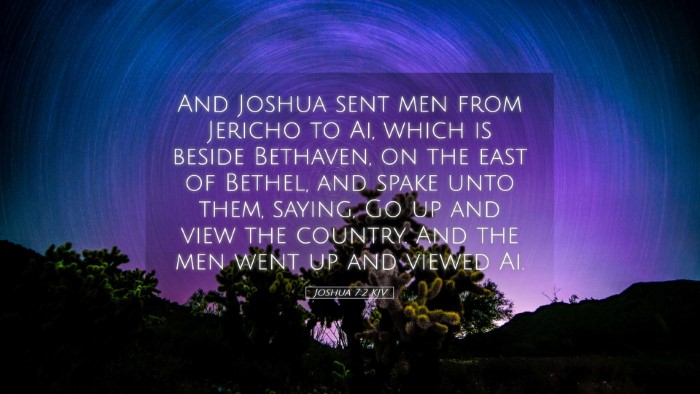Commentary on Joshua 7:2
Verse: "And Joshua sent men from Jericho to Ai, which is beside Beth–aven, on the east side of Bethel, and spake unto them, saying, Go up and view the country. And the men went up and viewed Ai."
Introduction
This verse marks a pivotal moment in the narrative of Israel’s conquest of Canaan. Joshua, as the leader of Israel, demonstrates a proactive approach in military strategy by sending men to survey the land of Ai. This commentary seeks to extract insights from several public domain sources including Matthew Henry, Albert Barnes, and Adam Clarke, each of whom offers a unique perspective on the implications and spiritual lessons inherent in this verse.
Historical Context
According to the context provided by Albert Barnes, the strategy employed by Joshua is indicative of the military customs of the time. The act of sending spies to assess the strength and layout of an enemy's city was a common practice in warfare. This illustrates a principle of prudence and preparation that is invaluable in both spiritual and practical affairs.
Meaning of Ai and Beth-Aven
The reference to Ai and Beth-aven carries deeper implications. Adam Clarke notes that Ai symbolizes the challenges and obstacles Christians face, while Beth-aven, which translates to "house of vanity," contrasts sharply with Bethel, or "house of God." This duality speaks to the choices believers face between the temptations of the world and the high calling found in obedience to God.
Theological Insights
The spiritual lessons drawn from Joshua’s actions are profound. Matthew Henry emphasizes that Joshua's decision to send scouts nevertheless reflects an underlying dependence on God. While strategic planning is essential, it must always be coupled with reliance on divine guidance. This is a vital reminder to pastors and theologians that our best-laid plans must ultimately submit to God's will.
- Preparation and Prayer: Leaders must be prepared in strategy but equally committed to prayer. Joshua did not act in haste; he sought information about the enemy beforehand.
- Faith vs. Fear: Though Israel had just experienced a monumental victory at Jericho, faith should not lead to recklessness. Proper assessment of future endeavors is necessary for faithful leadership.
Practical Applications
The lessons from Joshua 7:2 can be translated into practice in several ways:
- Discernment in Decision-Making: Just as Joshua sought to gather intelligence, pastors and leaders today must seek discernment when faced with new ventures, ensuring they are aligned with God’s purpose.
- The Danger of Overconfidence: Despite past victories, overconfidence can lead to failure, as will be evident in the following verses. It serves as a reminder for all believers to remain humble and vigilant.
Reflections on Leadership
Joshua’s leadership can be studied further through the lens of humility and service. Albert Barnes suggests that Joshua exemplifies a servant leader; he does not assume that success will follow without due diligence. This strongly correlates with biblical leadership, characterized by seeking guidance and humble submission to God's direction.
Consequences of Inaction
The failure to prepare can have dire consequences, as the following events in Joshua lead to the defeat at Ai, primarily due to the sin of Achan. This serves as a crucial warning about the connection between individual choices within the community of faith and their collective outcomes. Matthew Henry insightfully connects this to the broader theme of holiness and obedience in the life of God’s people.
Conclusion
In summary, Joshua 7:2 offers a wealth of insights into leadership, preparation, and the delicate balance between faith and action. It reminds scholars, pastors, and all students of the Word to intertwine strategic planning with unwavering dependence on God. As we navigate our own spiritual journeys, may we continually seek His guidance and remain vigilant against overconfidence in our achievements.


